Final report for SVA16-001
Project Information
The College of Agriculture and Life Sciences at Virginia Tech and the School of Agriculture at Virginia State University are strongly committed to the SARE Professional Development Program. Virginia Tech and Virginia State University through Virginia Cooperative Extension, along with community and organizational partners, continue to host and sponsor professional development workshops and programs each year. These workshops and programs help build interest and strengthen the implementation of sustainable methods and practices across Virginia, especially in the areas of ecological soil management, cover cropping, community food systems, grassland agriculture, and overall market diversification for meat, milk, vegetable and fruit producers. There continues to be strong consumer interest in how food is produced and where food comes from. Additionally, there is more interest in community, local and regional food systems that encourage local and regional connections, which can strengthen and foster sustainable agriculture efforts. Virginia Cooperative Extension, through our SARE initiatives, organizational partnerships, and professional development program, seeks to serve all of agriculture and fully integrate sustainable farming practices that emphasize the community, economic and ecological components of sustainability throughout the food and agricultural system. We will continue to provide the most current and best scientific information and research so that producers and citizens can meet their individual and community objectives for sustainability and resilience.
1) Annually conduct training regarding sustainable agricultural practices and Southern Region SARE programs on a statewide basis and in conjunction with other planned agent and partnering agencies (i.e., NRCS, FSA, SWCD, Farm Credit) existing training programs to reach the following:.
• at least one hundred Extension Agents (VCE)
• Twenty Farm Service Agency (FSA) personnel and Farm Credit system personnel
• Fifty Natural Resource Conservation Service (NRCS) and Soil and Water Conservation District personnel
2) Annually conduct train-the-trainer training on a statewide basis and in conjunction with existing annual conferences and/or field meetings to reach at least 400 persons including farmer, landowners, farming associations, state government agency personnel, county government personnel, nongovernment organizations (NGO's) and community-based organizations (CBOs).
3) Annually conduct training with at least 80 underserved limited resource farmers, landowners and community leaders, including African-Americans, Hispanics, Asians, Native Americans, women, and persons who have limited access to land, labor, and capital regarding sustainable agriculture practices and Southern Region SARE programs and resources.
Virginia is fortunate to have 46,030 farms and more than 8.3 million acres of farmland (U.S. Department of Agriculture’s 2012 Census of Agriculture). These farms are not one-size-fits-all but uniquely different based on location, physiography, resources, size, history, and values. Virginia SARE, in collaboration Virginia Tech and Virginia State University, works to leverage agricultural and community partnerships in education and research to develop place and values-based food systems, which are embedded with and founded on core sustainable agricultural principles and values, across Virginia to serve farms of all sizes. Virginia SARE and its educational partners realize farmers of all sizes are finding common ground around sustainable agriculture topics and their mutual interest in soil health, cover cropping, and better farm-to-table connections. Within this context, Virginia's 2016 - 2017 Model State Program and its professional development programming focused on peer-to-peer learning and training for Extension educators, USDA professionals, and mentor farmer-leaders to encourage implementation of core soil health principles and practices, adoption of diverse cover cropping systems, and development of more community-focused food and farm connections to benefit farmers, while strengthening community resilience and Virginia's local and regional food systems. In 2016 - 2017, Virginia SARE supported and encouraged participation of USDA and Extension personnel and farmer mentor-leaders in the 2016 Southern Cover Crop Conference, the 2016 Virginia Farm to Table Conference, Virginia Association for Biological Farming's 2017 Annual Conference, the 2017 American Forage and Grassland Council's Conference, a soil health and regenerative farming training with Gabe Brown at the Organic Growers School, a two-day Visioning for Food System Change Workshop, and the North American Agroforestry Conference. Networking and finding common ground around sustainability and conservation were important facets of all of these training programs. The intended audience for Virginia's 2016 – 2017 Model State Plan of Work was Extension and USDA professionals (i.e., Natural Resources Conservation Service, Farm Service Agency, Rural Development, Farm Credit, and Soil and Water Conservation Districts, Forestry etc.) and mentor farmer-leaders working on sustainable agriculture, resource conservation, community, local and regional food systems, and community economic development issues.
Advisors
- (Educator)
- (Educator)
- (Educator and Researcher)
- (Educator and Researcher)
- (Educator)
- (Educator)
- (Educator)
- (Educator)
- (Educator)
- (Educator)
- (Educator)
Education
Virginia SARE utilizes a collaborative train-the-trainer approach to build the educational and instructional capacity of Extension and USDA professionals and mentor farmer leaders to address current and emerging sustainable agriculture related issues. This approach includes direct instruction, peer-to-peer learning, networking, farmer case studies, and in-field demonstrations. Additionally, members of the Virginia SARE Advisory Committee have worked collaboratively with other organizations and conference planning committees to influence and shape training agendas of workshops, field days, and applicable conferences. Virginia SARE focuses on key topics such as soil health, reduced tillage, cover cropping, crop diversification, sustainable business planning, more direct and intermediate marketing, community-focused food systems, grazing, systems-thinking, and efforts to enhance resilience to crop and livestock systems. We seek to leverage resources, be opportunistic with emerging opportunities, piggyback training when feasible, and collaborate to meet the state's educational goals.
Education & Outreach Initiatives
To strengthen Virginia's educational and outreach network of educators and champions of soil health and cover cropping systems to include Extension, USDA-NRCS, Soil and Water Conservation Districts, and mentor farmers to create more resilient and viable farming systems for agronomic, livestock, and horticultural operations across the state.
Soil, water, and air are foundational resources for farming, natural resource conservation, and health in the 21st century. Sound ecological soil management that includes minimizing soil disturbance and keeping soils covered to prevent losses and build soil health continues to be an educational and outreach priority of Virginia's Sustainable Agriculture Research and Education (SARE) Program. Peer-to-peer learning and training around core soil health principles were a key emphasis of professional development programming. In 2016 - 2017, Virginia SARE provided professional development training related to soil health and cover cropping systems for Extension educators, USDA professionals, and mentor farmer-leaders by providing travel scholarships and conference registration support to the 2016 Southern Cover Crop Conference, 2016 Virginia Farm to Table Conference, the North Carolina Organic Growers School with Gabe Brown, the 2017 Virginia Association for Biological Farming Conference, and the Eastern Shore Cover Crop In-Service Training and Team Building Event in April 2017.
In July 2016, the Virginia SARE helped send a professional development audience of 55 Virginians to the Southern Cover Crop Conference in Goldsboro, NC. This Virginia delegation consisted of cover crop specialists, soil health promoters, and advanced practitioners from across the state, including Extension Agents and Specialists from Virginia State University and Virginia Tech, USDA-NRCS staff, leading farmers, industry representatives, and other partners. This was an especially successful educational and partnership-building trip as the 55 Virginia participants received 12 hours of professional development related to soil health and cover crops. New networks and relationships were strengthened through conversations in the rental vans and the conference workshops. Similarly, Virginia SARE helped to shape the practical applications of soil health track offered at the 2016 Virginia Farm-to-Table Conference and provided educational support so 39 educators and practitioners could learn from featured speakers Alex Hitt of Peregrine Farm and Dr. Ron Morse of Virginia Tech. Additionally, Virginia SARE provided educational support for nine Extension agents, USDA, and mentor-farmers from Southwest Virginia to attend a day-long workshop on the soil as an ecosystem with Gabe Brown of Browns Ranch. Another key training venue for educators and champions of soil health and cover cropping systems was the Virginia Association for Biological Farming's 2017 Annual Conference.
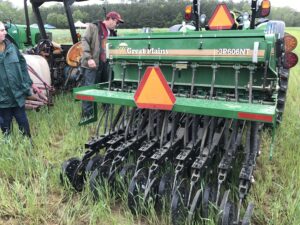
Virginia SARE partnered with Virginia Tech Extension Specialist Mark Reiter and USDA-NRCS State Cropland Agronomist Chris Lawrence to organize the Eastern Shore Cover Crop In-Service Training and Team Building Event in April 2017. This training was particularly well-received. Ninety-three Extension educators and USDA professionals, and farmer mentor-leaders attended the 1 1/2 day training. The training was held at Virginia Tech's Eastern Shore Extension Research Education Center and featured several SARE funded research projects led by Extension Specialists and conducted by graduate students who received SARE educational scholarships. The event was a good partnership for Virginia SARE as it leveraged educational resources while highlighting the separate research and educational efforts of SARE and USDA-NRCS funded Conservation Innovation Grants.
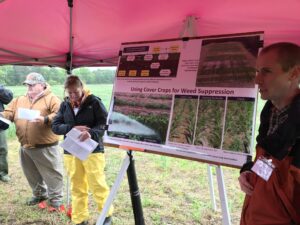
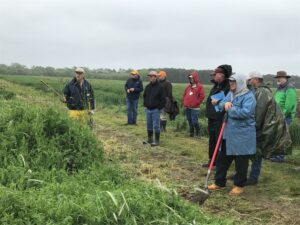
Virginia SARE provided 30 hours of professional development training in the areas of soil health and cover cropping to 265 Extension educators, USDA professionals, and mentor farmer-leaders in 2016 - 2017. Similarly, Virginia SARE by helping to shape the agendas for the 2016 Virginia Farm to Table Conference and the Virginia Association for Biological Farming Annual Conference over 600 participants at these conferences learned about core soil health principles through two short videos that profiled two Virginia soil health champions and sustainable agriculture practitioners during the general sessions. One notable outcome from the 2016 Southern Cover Crop Conference was that a subset of the Virginia delegation became extremely interested in the rolling of cover crops based on what they heard about and saw demonstrated at the training. Since their return to Virginia, this smaller group of Virginia NRCS staff, Extension personnel, and farmers have been researching cover crop rolling.
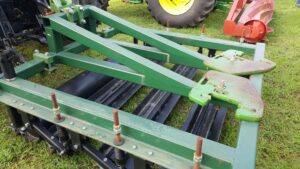
One notable outcome from the 2016 Southern Cover Crop Conference was that a subset of the Virginia delegation became extremely interested in the rolling of cover crops based on what they heard about and saw demonstrated at the training. Since their return to Virginia, this smaller group of Virginia NRCS staff, Extension personnel, and farmers have been researching cover crop rolling. An outcome of this educational programming is that Virginia now has a cadre of 150 soil health and cover crop educators and champions who want to continue to work and learn together. To improve communication and coordination as more of a learning and demonstration network, Virginia (c/o Dr. Wade Thomason et al.) submitted a proposal to Southern SARE to support two-years of professional development to formalize and build the capacity of this fledgling network so the peer-to-peer knowledge and experiences can be shared across the state and region.
To equip and train Virginia's Extension educators, USDA professionals, farmer mentor-leaders about community, local, and regional food system issues and topics to cultivate and nurture healthy farms, resilient communities, and vibrant just food systems and economies.
Virginia’s food systems directly impact the survival and viability of farms and farmland; the economic development of rural and urban communities; the care, restoration, and resilience of ecological resources such as local waterways; and critical health issues. Community, local, and regional food systems are complex and interconnected networks that comprise sustainable farming and food production, processing, distribution, consumption, and waste management to bring about social, economic, and ecological change that benefits farms, communities, and all residents. A community-focused food system must be cultivated and nurtured by local leadership and strong community ties that include a diversity of voices and ideas. This educational and developmental approach involves collaborations and partnerships to create healthy farms, resilient communities, and vibrant just food systems and economies. Virginia SARE, with its collaboration with Virginia Tech, Virginia State University, USDA agency partners, farmer mentor-leaders as advisors, is well-positioned to provide educational and developmental leadership to cultivate healthier farms and more resilient communities through local and regional food systems.
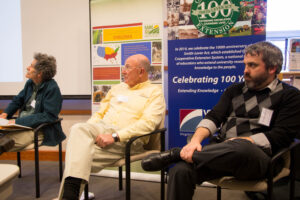
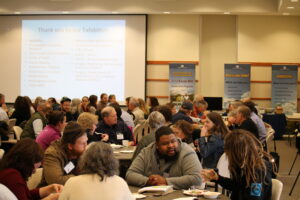
The cultivation and nurturing of community-focused food systems to benefit farms, communities, and people continue to be an educational and outreach priority for Virginia's Sustainable Agriculture Research and Education (SARE) Program. In 2016 - 2017, Virginia SARE provided professional development training related to community, local and regional food systems for Extension educators, USDA professionals, and mentor farmer-leaders by providing travel scholarships and conference registration support to the 2016 Virginia Farm to Table Conference, the 2017 Virginia Association for Biological Farming Conference, and the Visioning and Bottom Line Change Workshop for Virginia’s Food System in May 2017. These professional development training opportunities specifically focused on business planning, market development, whole farm and crop budgets, crop diversification, practical applications for soil and water conservation, making local and regional foods more accessible, food system planning, collective impact, and visioning and bottom line organizational change.
To continue the conversation about equity and access in the food system, the 2016 Virginia Farm to Table Conference featured a number of notable speakers and panelists. Dr. Ricardo Salvador of the Union of Concerned Scientists, Ellen Kahler of the Vermont Sustainable Jobs Fund and Vermont Farm to Plate, Chef Michael Twitty of Africulinaria, Nancy Yarnell of Food Security for America, and Glyen Holmes of the New North Florida Cooperative were plenary speakers. Additionally, to provide train-the-trainer opportunities on whole farm planning and crop budgets, Tony Kleese of Earthwise Organics and Tom Stanley of Virginia Cooperative Extension provided six hours of in-depth training on budgeting to 21 Extension educators, USDA personnel, lending officers, and farmer mentor-leaders at the Virginia Farm-to-Table Conference. For people interested in state and county-wide food system initiatives, Ellen Kahler of the Vermont Sustainable Jobs Fund provided four hours of instruction on guiding food system level change. keeping momentum, and measuring change. Other instruction included discussion about ways to minimize food waste from the farm gate to the table and beyond.
Virginia SARE through educational support of travel, registration, and resource speakers provided 40 hours of professional development training in the area of community-focused food systems including topics on business planning, market development, whole farm and crop budgets, crop diversification, practical applications for soil and water conservation, making local and regional foods more accessible, food system planning, collective impact, and visioning and bottom line organizational change to 98 Extension educators, USDA professionals, and mentor farmer-leaders in 2016 - 2017. Virginia SARE helped to shape the agendas for the 2016 Virginia Farm to Table Conference, the Virginia Association for Biological Farming's 2017 Annual Conference, and the Visioning and Bottom Line Change Workshop for Virginia’s Food System in May 2017. By partnering to leverage educational resources, 645 participants at these conferences learned about sustainable agriculture practices and ways to create healthy farms and resilient communities.
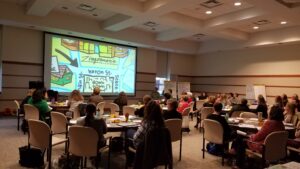
The two-day training on visioning and bottom line organizational change for Virginia's food system had immediate impacts as five organizations used the visioning bottom line change approach after the training to work with their employees and staff. The organizations included: Fauquier Fresh, Friendly City Food Cooperative, Woodstock Chamber of Commerce, Harrisonburg City Public Schools, and the Virginia Beginning Farmer and Rancher Coalition. Also, the two-day training resulted in a draft 8-page vision for Virginia's food system for 2027. The draft vision included eight themes with specific emphasis on sustainability, equity, access, resilience, and capacity building. A committee is working to finalize the vision so the final version can be read and shared at upcoming fall conferences and specifically at the 2017 Virginia Farm to Table Conference.
To promote systems based resilience through professional development of Extension Educators, USDA personnel, and Farmer Mentor-Leaders in grassland agriculture and agroforestry.
Virginia hosted the American Forage and Grassland Council's Annual Conference and the North American Agroforestry Conference in 2017. These two conferences presented a unique train-the-trainer opportunity to enhance Extension, USDA professionals, and Farmer Mentor-Leaders’ education and knowledge of grassland agriculture and agroforestry. The AFGC Conference addressed the triple bottom line of sustainable agriculture through in-depth training and educational networking in grassland management, soil health, and sound marketing and economics. Virginia SARE provided educational support to enable 40 Extension, USDA professionals, and farmer-mentors to attend the 3-day conference. Virginia SARE supported the opening session with Courtney White on resilience and more carbon-based farming. His presentation was titled ‘Grass, Soil, Hope: Regenerative Solutions for Changing Times.’ The topic is emerging and is of particularly relevant to educators and technical service providers as Virginia encourages more systemic approaches in building resilience and long-term sustainability and profitability. Additionally, Dr. Gary Lacefield of the University of Kentucky presented The Graziers’ Toolbox with practical educational and implementable practices for more sustainable and economical grazing. The conference offered specific training tracks based on species, but then offered in-depth training on restorative grazing principles and soil building techniques applicable to any farm or operation.
Virginia SARE provided educational support for nine Extension and USDA professionals and farmer-mentors to attend a training with Gabe Brown of Brown Ranch that was hosted by Living Web Farms and the Organic Growers School in Western North Carolina. Gabe Brown has more than 30 years of experience farming just outside of Bismarck, North Dakota in a region defined by intense weather challenges created by winter storms, extreme heat and cold, severe thunderstorms, drought and flooding rains. Since Gabe is a dynamic speaker and transformative thinker, Virginia SARE worked to identify key personnel in associated with Virginia No-Till Alliance in SW Virginia and the areas adjoining Western North Carolina to attend the training to expose them to regenerative farming principles and new ways of looking at systems.
The main objective of this educational initiative was to further develop a cadre of 40 to 50 trainers, educators, and mentors around the state on regenerative practices, holistic thinking, and ecological systems, specifically related to system resilience in grassland agriculture and agroforestry settings. The 49 people who participated in the training were identified in consultation with key collaborators like Virginia State University, Virginia USDA-NRCS, and key stakeholders such as Virginia Association of Biological Farming, the Virginia Forage and Grassland Council, and Virginia's No-Till Alliance to form a broader educational community and learning network around systems and the topic of resilience. An emerging impact is that the topic of system resilience is more at the forefront of people's minds and these collaborators and stakeholders are having preliminary discussions on having more in-depth training on resilience as it relates to weather variability, climate change, crop and system diversification, and whole farm risk management.
Educational & Outreach Activities
Participation summary:
Learning Outcomes
Project Outcomes
Systems thinking, systems leadership, resilient systems, and network analysis, along with core sustainable agriculture practices, are topics that need to be continually emphasized since sometimes the biggest obstacle to sustainability is the way we think and perceive the world.
Face of SARE
Virginia’s SARE program focuses its outreach and promotional efforts to increase SARE's public presence at events and conferences; regularly update the Southern SARE web page with content from Virginia, and increase its online and social media presence through Facebook; and to contribute to an electronic newsletter, Fresh Perspectives, developed by Extension. Collaboration and coordination with partner organizations continue to be important focuses for Virginia's professional development training opportunities so resources can be optimized and leveraged where and whenever possible. Virginia SARE is also trying to be more intentional in addressing equity, fairness, and justice in relation to sustainable agriculture and resilient food systems.